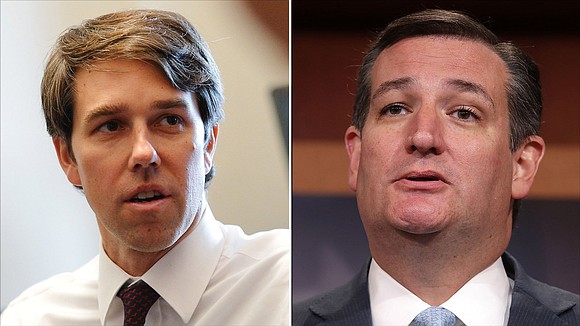Here's a little secret about the Texas Senate race
CNN/Stylemagazine.com Newswire | 9/10/2018, 12:11 p.m.
Analysis by Chris Cillizza, CNN Editor-at-large
(CNN) -- It feels like this past weekend is when the GOP political world finally realized something: Beto O'Rourke isn't going away.
Republican luminaries from Senate Majority Whip John Cornyn (Texas) to Republican National Committee Chair Ronna McDaniel to Office of Management and Budget Director Mick Mulvaney were quoted over the past 96 hours expressing real concern about the reelection chances of Sen. Ted Cruz in Texas.
"We're not bluffing, this is real, and it is a serious threat," Cornyn told Politico.
Texas being competitive is a big deal -- and not necessarily for the reason you might think.
Obviously, a Republican-held seat in jeopardy -- particularly in an election cycle where Democrats have very few pickup opportunities -- is a major development. Democrats need to net 3 seats to win back the Senate majority, a prospect that seemed impossible at the start of the 2018 cycle given that they were defending 26 seats, compared to just 9 for Republicans. But as CNN's Terence Burlij details here, the possibility of a pickup in Texas makes Democrats' math and path to the majority at least possible.
That, in and of itself, would be noteworthy. But the competitiveness of Texas also means something very important and less obvious: There may be less Republican money to go around in other states if that cash has to be spent on saving Cruz.
Remember that when it comes to spending on the Senate majority, Newton's third law applies: Every action has an equal and opposite reaction. Let's say there is $2 billion-ish to be spent by candidates, party committees and super PACs on Senate races in 2018. (More than $4 billion was spent on House and Senate races in 2016, according to the Center for Responsive Politics.) Spending that pot of cash in one state means not spending it somewhere else. It's that simple.
That's not a big deal when, say, North Dakota's Senate race becomes surprisingly competitive. (This is a hypothetical: North Dakota has been competitive all year and is now leaning toward Republicans. Don't @ me.) The media markets in North Dakota are just not very expensive. Which means that you can make a major statewide TV buy without significantly drawing down that $2 billion pot.
Texas isn't North Dakota, however. While North Dakota has 0 of the 100 top media markets in the country, Texas has 6: Dallas (5th), Houston (8th), San Antonio (31st), Austin (39th), Waco (87th) and El Paso (92nd). Which means, in simple terms, a competitive Senate race in Texas is going to take tens of millions of dollars in spending for Republicans to move the needle for Cruz.
Think of it this way: In 2014, Cornyn was re-elected in a walk. He spent $14.7 million. Two years earlier, Sen. Heidi Heitkamp spent $5.5 million to win the North Dakota Senate seat with 50% -- one of the most competitive and close Senate races in the country that year. It's simply apples and oranges as it relates to what it takes to make a dent with voters in Texas versus North Dakota.
Which bring us to Cruz's current predicament. While he and O'Rourke had raised roughly the same amount as of June 30 ($23 million), Cruz had $9 million left in the bank as compared to $14 million for O'Rourke. So the incumbent was already $5 million in the hole in mid-summer. That difference will need to be made up by some combination of party committees and super PACs -- most especially the Senate Leadership Fund, which is closely aligned with the GOP's leadership in the chamber.
And make no mistake: The party committees -- especially the National Republican Senatorial Committee -- will spend heavily on Cruz. That committee is, at root, an incumbent-protection agency. Its first purpose is to help Republican incumbents get re-elected. And Cruz is one of the most high-profile incumbents -- of either party -- up this November.
The numbers there are worrisome for Republicans, too. As of the end of July, the NRSC had $22.75 million on hand as compared to $35 million for their Democratic counterpart. The Senate Leadership Fund ended the last filing period with $45 million in the bank, $20 million more than the largest Democratic Senate super PAC, but the latter already made $80 million in ad reservations in key states earlier this summer.
Add it all up and you get this: Texas becoming competitive is a major financial problem for Republicans who are trying to hang onto their Senate majority. If money -- and, per above, we are likely talking about spending north of $10 million -- has to be diverted to save Cruz, it means that same money has to be diverted from pickup opportunities. And that means the chances of Republicans capitalizing on those pickup opportunities shrinks -- perhaps marginally, perhaps in a more major way.
Cruz's inability to put O'Rourke away matters then not just in Texas but in West Virginia, Missouri and Indiana too.




